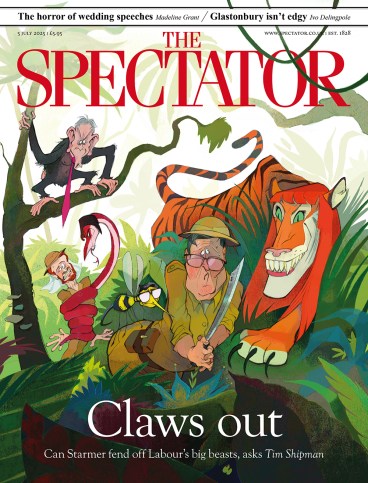
John Connolly has narrated this article for you to listen to.
For Keir Starmer, it seems everything is going south. His MPs are openly rebelling, his advisers are mutinous and it often feels as though he can’t decide whether to run the country as human-rights-lawyer-in-chief or as Nigel Farage-lite. It’s no wonder that some in his party are beginning to look north for an answer to the party’s woes – specifically to Manchester, where Andy Burnham increasingly looks like the King over the river Irwell.
With the government trapped in an ideological Bermuda triangle, Greater Manchester suggests there is a way out – a way for Labour to govern effectively. The region has had the highest productivity growth in the UK over the past two decades (up a remarkable 31 per cent), with economic output increasing by almost a quarter since Burnham became mayor in 2017. Eighty of the FTSE 100 companies now have a base in Manchester, and for three of the past five years the city has been the largest recipient of foreign investment outside London.
You can see the impact this is having on the city’s skyline. Eight years ago, a single skyscraper, the Beetham Tower, stuck out of Manchester like a sore blue thumb. Today, there are eight skyscrapers above 500ft and there is another series of mega towers in the works. Housebuilding is up by a third since 2017 and projects are under way in Victoria North and around Old Trafford, with the potential to create up to 42,000 homes. It is almost disorientating to walk around the city centre, given the pace of the change. Even the tiniest bits of scraggy car park have been turned into luxury apartments. Burnham cannot take sole credit for this boom – many of the foundations were laid by previous city council administrations, led by the late Sir Howard Bernstein, but it is undeniable that he is making his mark.
Take his bright yellow ‘Bee Network’ buses which tootle in and out of the city. It may seem like a small thing, but Manchester’s buses have been dreadful for years. By bringing them under local control (as in London), the city has been able to change 75 routes to make them more reliable. In the first two Bee Network areas passenger numbers are up 14 per cent while tram passenger numbers are up by almost a fifth as well.
The city is getting safer too since the appointment of Greater Manchester Police (GMP) chief Stephen Watson, with his novel approach of getting the police to focus on actually solving crimes. In 2020, GMP was in special measures and failing to record a quarter of violent crimes. Last year, recorded crime was down 8 per cent, personal theft was down 28 per cent, vehicle offences were down 18 per cent, and residential burglaries were down 11 per cent. Arrests were up by 5 per cent.
Unlike much of the rest of the country, it feels as though Greater Manchester is getting better
None of this is to say that Manchester is perfect. The city certainly has its fair share of scuzz – one popular YouTuber regularly films himself in the city centre Spartan-kicking drug addicts and aggressive youths. And Piccadilly Gardens is still a blight on the city. But unlike much of the rest of the country, it feels as though Greater Manchester is getting better. In other words, Burnhamism is working.
Burnham seems to be aware of his national relevance. This week, speaking from what may be the most insufferable corner of the country – the ‘Left Field Tent’ at Glastonbury – he told Labour MPs to vote down the government’s watered-down welfare bill because it was only a ‘50 per cent U-turn’. He also opposed cuts to the winter fuel payment and the initial failure to hold a national grooming gangs inquiry. But it is his record, rather than his political statements, that should be of much more interest to this embattled Labour government.









Comments